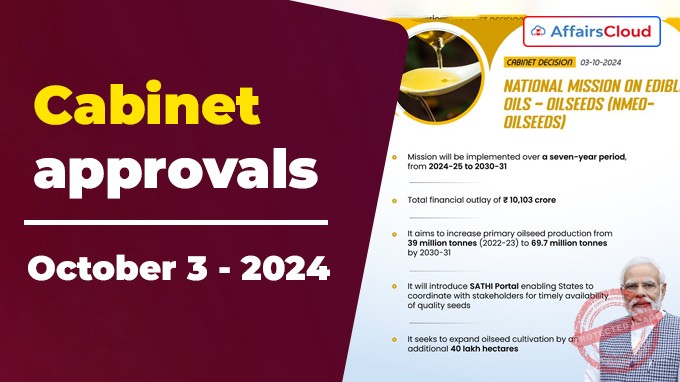 On 3rd October 2024, the Union Cabinet chaired by Prime Minister (PM) Narendra Modi approved the following,
On 3rd October 2024, the Union Cabinet chaired by Prime Minister (PM) Narendra Modi approved the following,
- Modified Productivity Linked Reward (PLR) Scheme for the major ports and dock labour Board employees/workers from 2020-21 to 2025-26.
- The Pradhan Mantri Rashtriya Krishi Vikas Yojana (PM-RKVY) to promote sustainable agriculture and the Krishonnati Yojana (KY) to achieve food security for self-sufficiency.
- India to Join the International Energy Efficiency Hub by signing the Letter of Intent(LoI).
- Conferring the status of Classical Language to Marathi, Pali, Prakrit, Assamese and Bengali languages.
- Chennai Metro Rail Project Phase II comprises three corridors.
- Productivity Linked Bonus (PLB) for 78 days to railway employees.
- the National Mission on Edible Oils – Oilseeds (NMEO-Oilseeds) for 2024-25 to 2030-31.
- Creation of a post of the Presiding Officer for the Special Tribunal (full time) at Talcher, Odisha under the Coal Bearing Areas (Acquisition & Development) Act, 1957.
Cabinet approves modified PLR Scheme for the major ports and dock labour Board employees/workers from 2020-21 to 2025-26
The Union Cabinet chaired by PM Modi has approved the improvisation of the existing Productivity Linked Reward (PLR) Scheme for the major ports and dock labour Board employees/workers from 2020-21 to 2025-26.
- The total financial outlay for the entire period will be about Rs 200 crore.
- This scheme will benefit about 20,704 employees of Major Port Authorities and Dock Labour Board Employees/workers.
Key Points
i.Ministry of Ports, Shipping and Waterways(MoPSW) has modified the Productivity Linked Reward (PLR) Scheme for all Major Port Authorities and Dock Labor Board employees/workers for 2020-21 to 2025-26 that has increased the weightage for calculation of PLR specific to port performance instead of weightage to all India performance.
ii.PLR has been calculated on the wage ceiling for the calculation of Bonus at Rs 7000 per month. PLR will be paid annually by increasing the port-specific performance weightage from 50% to 55% and further increasing to 60%.
iii.The All-India Port performance weightage is expected to decline to 40% over a period till 2025-26.
- Currently, equal weightage of 50% was provided for the All-India port performance and the specific Port performance.
iv.This PLR Scheme will foster better industrial relationships and boost productivity.
Note: PLR is an existing scheme for the employees/workers of Major Port Trusts and Dock Labour Board in which financial rewards are being provided to employees/workers every year according to the settlement arrived at between Management and the Labour Federations of the Major Port Authorities.
Cabinet approves the PM-RKVY and Krishonnati Yojana (KY):
The Union Cabinet has approved the proposal of the Department of Agriculture & Farmers Welfare (DA&FW) for the rationalisation of all Centrally Sponsored Schemes (CSS) operating under the Ministry of Agriculture and Farmers’s Welfare (MoA&FW) into two umbrella Schemes- Pradhan Mantri Rashtriya Krishi Vikas Yojana (PM-RKVY), a cafeteria scheme and Krishonnati Yojana (KY).
- PM-RKVY will promote sustainable agriculture, while KY will work towards achieving food security & agricultural self-sufficiency.
Key Points
i.The total allocated expenditure for both the PM-RKVY and KY will be Rs 1,01,321.61 crore.
ii.Out of the total provided expenditure, the projected expenditure towards central share of DA&FW is Rs 69,088.98 crore and the states share is Rs 32,232.63 crore.
- This includes Rs 57,074.72 crore for RKVY and Rs 44,246.89 crore for KY.
iii.These Schemes will be implemented through the State Governments.
Highlights of the Amendments:
i. The scheme Mission Organic Value Chain Development for North Eastern Region (MOVCDNER) which is a component under the KY, is being modified through the addition of a component namely MOVCDNER- Detailed Project Report (MOVCDNER-DPR), which will provide flexibility to the North Eastern states to address critical challenges.
ii.Another aim of the change is to provide freedom to the state governments to re-allocate funds from one component to another based on their state-specific requirements in PM-RKVY.
iii. The rationalisation will also help focus on emergent challenges of Agriculture – Nutrition security, Sustainability, Climate resilience, value chain development & private sector participation.
iv.Annual Action Plan (AAP) of States can be approved directly rather approving individual scheme-wise AAPs.
Note
The PM-RKVY comprises of the following schemes:
- Soil Health Management
- Rainfed Area Development
- Agro Forestry
- Paramparagat Krishi Vikas Yojana
- Agricultural Mechanization including Crop Residue Management
- Per Drop More Crop
- Crop Diversification Programme
- RKVY DPR component
- Accelerator Fund for Agri Startups
Cabinet approves India to Join International Energy Efficiency Hub by signing the Letter of Intent
The Union Cabinet has approved the signing of ‘Letter of Intent’ that led India to join the ‘Energy Efficiency Hub’.
- India will join the International Energy Efficiency Hub (Hub), a global platform working towards enhancing collaboration and promoting energy efficiency worldwide.
- Bureau of Energy Efficiency (BEE), the statutory agency, will work as the implementing agency for the Hub on behalf of India promoting India’s participation in the Hub’s activities and aligning its contributions align with its energy efficiency goals.
About International Energy Efficiency Hub
i.This was established in 2020 succeeding the International Partnership for Energy Efficiency Cooperation (IPEEC), in which India was a member.
ii.The Hub integrates governments, international organizations, and private sector entities to share knowledge, best practices, and innovative solutions.
iii.As of July, 2024, sixteen countries (Argentina, Australia, Brazil, Canada, China, Denmark, European Commission, France, Germany, Japan, Korea, Luxembourg, Russia, Saudi Arabia, United States and United Kingdom) have joined the Hub.
Cabinet approves conferring status of Classical Language to Marathi, Pali, Prakrit, Assamese and Bengali languages
The Union Cabinet has approved to provide the status of Classical Language to Marathi, Pali, Prakrit, Assamese and Bengali languages.
- As of now, India has six classical languages – Tamil(2004), Sanskrit(2005), Kannada(2008), Telugu (2008), Malayalam(2013) and Odia(2014).
- Tamil was the first language to get classical language status.
Benefits of Classical Language Status
Once a language is classified as a classical language, the Ministry of Education(MoE) provides certain benefits to promote it. They are
- Two major annual international awards for scholars of eminence in the said languages.
- A Centre of Excellence(CoE) for studies in classical languages.
- The University Grants Commission is requested to create, to start with initially in the Central Universities, a certain number of professional chairs for the classical languages.
Key Points
i.A Linguistic Experts Committee (LEC) was formed by the Ministry of Culture (MoC) under Sahitya Akademi in 2004 to examine the recommended languages for the status of Classical Language.
ii.Accordingly, Linguistics Experts Committee was formed in 2024 to revise the criteria. Sahitya Akademi has been appointed as nodal agency for the LEC.
- High antiquity of (its) is early texts/recorded history over a period of 1500- 2000 years.
- A body of ancient literature/texts, which is considered a heritage by generations of speakers.
- Knowledge texts, especially prose texts in addition to poetry, epigraphical and inscriptional evidence.
- The Classical Languages and literature could be different from its current form or could be discontinuous with later forms of its offshoots.
Cabinet approves Chennai Metro Rail Project Phase II:
The Union Cabinet has provided approval to the proposal of the Ministry of Housing & Urban Affairs(MoHUA) for Chennai Metro Rail Project Phase-II comprising three corridors.
- The total length of the 3 lines will be 118.9 km with 128 stations.
- The total project cost is Rs 63,246 crore and is planned to be completed by 2027.
- When Phase II is completed, Chennai will have a total Metro Rail network of 173 Km.
Details of the Phase II Project
The Phase II Project comprises three corridors:
- Corridor-(i): from Madhavaram to SIPCOT for a length of 45.8 Km with 50 stations.
- Corridor-(ii): from Lighthouse to Poonamalle Bypass for a length of 26.1 Km with 30 stations.
- Corridor-(iii): from Madhavaram to Sholinganallur for a length of 47 Km with 48 stations.
Benefits of the Project
i.Increased connectivity from North to South and East to the West of Chennai.
ii.Reduced traffic congestion and travel time
iii.Decreased carbon emissions
iv.Increased productivity of individuals
v.More equitable access to public transport, benefiting diverse socio-economic groups and reducing transport disparities
Cabinet approves and announces Productivity Linked Bonus (PLB) for 78 days to railway employees
The Union Cabinet has approved payment of Productivity Linked Bonus (PLB) of 78 days for Rs 2028.57 crore to 11,72,240 railway employees to reward the performance of the Railway Staff.
- The amount will be paid to various categories, of Railway staff like Track maintainers, Loco Pilots, Train Managers (Guards), Station Masters, Supervisors, Technicians, Technician Helpers, Pointsman, Ministerial staff and other Group C staff.
- The maximum payable to each eligible railway employee is Rs 17,951/- for 78 days.
Note:
Railways loaded a record cargo of 1588 Million Tonnes and carried nearly 6.7 Billion Passengers in 2023-24.
Cabinet Approves NMEO-Oilseeds for 2024-25 to 2030-31
The Union Cabinet has approved the National Mission on Edible Oils – Oilseeds (NMEO-Oilseeds) to boost domestic oilseed production and achieve self-reliance (Atmanirbhar Bharat) in edible oils.
- The mission will be implemented from 2024-25 to 2030-31, with a financial outlay of Rs 10,103 crore.
- The newly approved NMEO-Oilseeds will help in increasing the production of key primary oilseed crops such as Rapeseed-Mustard, Groundnut, Soybean, Sunflower, and Sesamum, as well as increasing collection and extraction efficiency from secondary sources like Cottonseed, Rice Bran, and Tree Borne Oils.
Highlights of the Mission:
i.The mission aims to increase primary oilseed production from 39 million tonnes (2022-23) to 69.7 million tonnes by 2030-31.
- Along with NMEO-OP (Oil Palm), the Mission aims to increase domestic edible oil production to 25.45 million tonnes by 2030-31 to cover around 72% of our projected domestic requirement.
ii. The mission will introduce an online 5-year rolling seed plan through the ‘Seed Authentication, Traceability & Holistic Inventory (SATHI)’ Portal, helping states to make advance tie-ups with seed-producing agencies, including cooperatives, Farmer Producer Organizations (FPOs), and government or private seed corporations and to ensure the timely availability of quality seeds.
- 65 new seed hubs and 50 seed storage units will be established in the public sector to improve the seed production infrastructure.
iii.Additionally, over 600 Value Chain Clusters will be developed in 347 unique districts, covering more than 10 lakh hectares annually and will be managed by FPOs, cooperatives, and public or private entities.
iv.The mission aims to add 40 lakh hectares to oilseed cultivation by targeting rice and potato fallow lands, promoting intercropping, and promoting crop diversification.
v.Support will be extended to FPOs, cooperatives, and industry players to establish or upgrade post-harvest units, enhancing recovery from sources such as cottonseed, rice bran, corn oil, and Tree-Borne Oils (TBOs).
vi.Furthermore, the Mission will promote information related to dietary guidelines for edible oils through an Information, Education, and Communication (IEC) campaign.
Additional info:
The Government of India has undertaken a series of measures to enhance domestic production of edible oils, including the launch of National Mission on Edible Oils – Oil Palm (NMEO-OP) with an outlay of Rs 11,040 crore to boost oil palm cultivation in India in 2021.
Creation of a post of the Presiding Officer for the Special Tribunal (full time) at Talcher, Odisha
The Cabinet has approved the creation of the post of Presiding Officer for a full-time Special Tribunal at Talcher, Odisha, under the Coal Bearing Areas (Acquisition & Development) Act, 1957.
- This decision has been taken to enable effective and speedy disposal of cases related to land acquisition and compensation in the Talcher coalfield, benefiting farmers and landowners in the region.
- Currently, the part-time tribunal at Talcher was handling the disputes resulting in a backlog of 860 cases as of 31st May 2024.
- Thus, to prevent this, the Government is setting up a special Tribunal ensuring faster resolutions and greater satisfaction for farmers & landowners.
Key Points:
i.The Special Tribunal will have the powers of a civil court, allowing it to summon witnesses, examine documents, and issue commissions for witness examinations enhancing legal framework for these disputes.
ii.This initiative will also strengthen public accountability, the rule of law, and improve the ease of living in the region.




